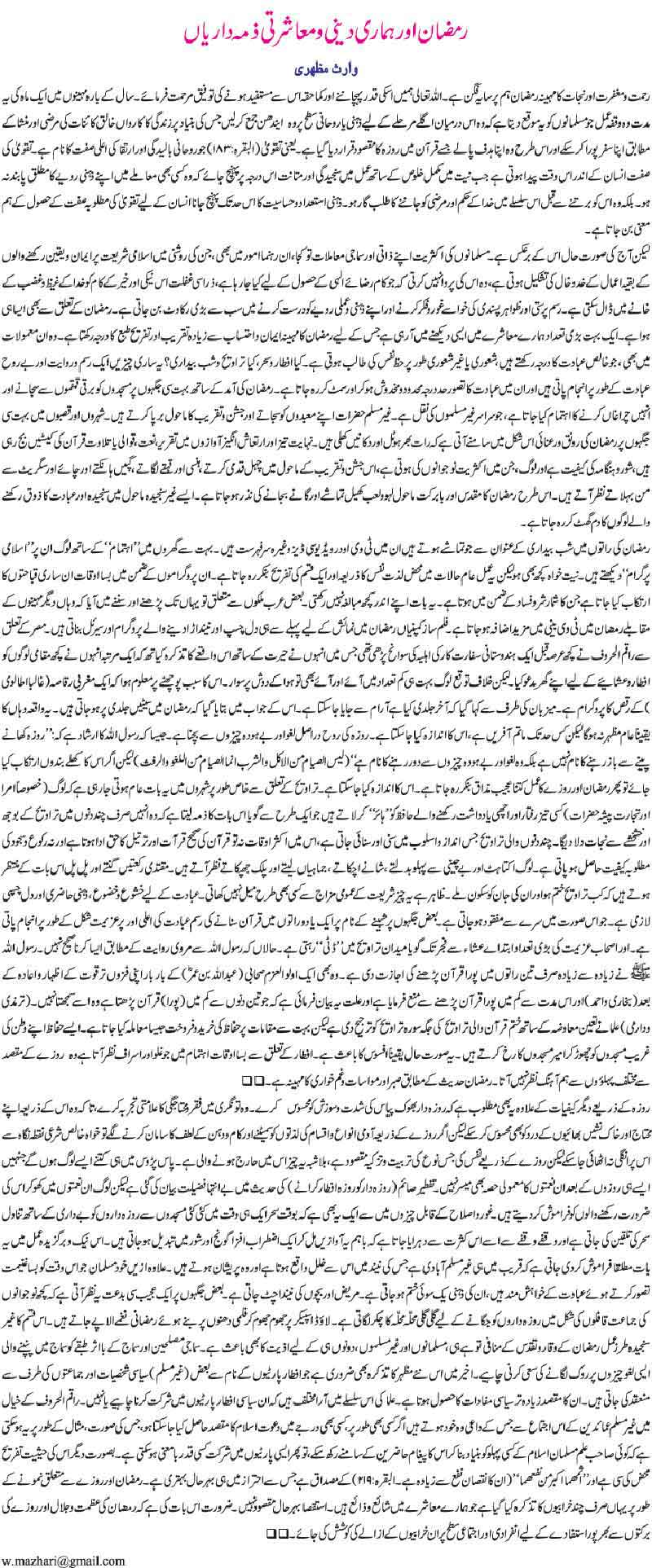02 Sep 2010, NewAgeIslam.Com
Stop self-indulgence in vogue in the month of Ramazan

It is also heard that in some Arab countries TV viewing increases in the month of Ramazan as compared to other months. Film producing companies make interesting programmes and serials in advance for telecast in Ramazan. I happened to read the autobiography of the wife of an Indian diplomat posted in Egypt in which she narrated an incident in astonishment. Once she invited some locals for iftar and dinner. But unexpectedly very few people turned up and even those who did were in great hurry. On enquiry she was told that there was a dance programme of a western (probably Italian) danseuse that evening. The host told them there was no hurry; they could go a little later. But they replied that the seats got occupied very quickly in Ramazans. -- Maulana Waris Mazhari

Our social and religious responsibilities in the month of Ramazan
BY Maulana Waris Mazhari
Ramazan, the month of divine blessings and salvation is on. May God bless us with the realisation of its true value and the moral strength to benefit from it fully. The month provides us with the opportunity to store fuel on the spiritual level for the next phase on which the caravan of life completes its journey according to the will of God, the creator and therefore achieves the goal which has been declared the purpose of fasting, that is, piety (Al Baqra:183) which is synonymous with the great virtue called spiritual growth and evolution. The virtue of Piety evolves in a man only when heart’s purity coupled with sincerity and diligence in deeds reach such a level that he is not bound by his own will, he would rather like to know the will of God before executing the deed. Reaching of the moral strength and sensitivity to that level becomes synonymous with the achievement of the desired virtue of piety.
But the situation is quite the opposite. The majority of the Muslims do not even bother to think while performing major religious practices which shape the nature of their duties, leave aside social and personal matters, that whether the work is being done to please God or may invite His wrath due to the slightest of ignorance. The love of customs and a penchant for exhibition becomes an obstacle in the way of their thinking and introspection.
Occasion for revelry rather than introspection
The same happens with Ramazan. As is generally seen, for a big section in our society Ramazan has become an occasion for entertainment and merrymaking rather than for strengthening one’s faith and introspection. Wittingly or unwittingly they seek pleasure and enjoyment even in those matters that are purely worship-related, be it iftar or sehri, or traweeh or shab bedari (nightlong prayers). All these practices are performed as mere customs or soulless prayers and the essence of prayer or worship disappears or diminishes in them.
With the advent of Ramazan, mosques in many places are illuminated with electrical lamps. This practice is inspired by the non-Muslims. Non-Muslims decorate their places of worship and organise celebrations. In cities and towns the hotels and shops remain open the whole night. Cassettes of speeches in shrill voice, naat and qawwali are played in full volume, there is noise and nuisance all around and people mostly young men are seen loitering, laughing and gossiping, smoking and sipping tea in an atmosphere of celebration. Thus, the holy month of Ramazan is wasted in merrymaking. In this atmosphere those willing to pray in peace and silence feel suffocated.
‘Islamic Programmes’ or a source of recreation
TV and video CDs are part of the funfair held in the name of shab bedari during Ramazan. In many households, people watch ‘Islamic Programmes’ with ‘devotion’. Whatever the intentions, the practice becomes merely a means of entertainment and a source of recreation. Sometimes, the acts committed during the programmes, are counted among the vices. There is no exaggeration in it.
In some Arab countries it is also heard that TV viewing increases in the month of Ramazan as compared to other months. Film producing companies make interesting programmes and serials in advance for telecast in Ramazan. I happened to read the autobiography of the wife of an Indian diplomat posted in Egypt in which she narrated an incident with surprise. Once she invited some locals for iftar and dinner. But unexpectedly very few people turned up and even those who did were in great hurry. On enquiry she was told that there was a dance programme of a western (probably Italian) danseuse that evening. The host told them there was no hurry; they could go a little later. But they replied that the seats got occupied very quickly in Ramazans.
The soul of fasting is lost
This incident may not reflect a general trend but it can be realised how disappointing it is. The soul of fasting is avoiding immoral and useless things as the Holy Prophet has said: Fasting does not mean mere abstention from food and drinks but it means abstaining from useless and immoral activities. (Lais al siyam min al akl wassharb innamas siyam minal laghw warrafas). But if these acts are committed brazenly then the fasting in Ramazan becomes a bizarre joke.
As for taraweeh, one thing that is commonly observed these days is that people (especially the rich people and businessmen) hire a fast hafiz with excellent memory who in a way assures them that he will ‘rid’ them of the ‘burden’ of taraweeh only in a few days. The way the ‘short term’ taraweeh is recited does not, in most cases, conform to correct recitation norms nor is the desired state of raku and sajda achieved. People are seen shifting their body weight, shrugging off their shoulders and yawning. The muqtadees (people offering namaz behind the imam) keep counting the raka’ts and impatiently wait for the taraweeh to be over so that they can heave a sigh of relief. Obviously, this attitude does not conform to the general temperament of sharia. For prayers, absorption, mental presence and interest are necessary which are simply non-existent in the situations mentioned above.
Fast-track Taraweeh is not devotional
In certain places, the practice of offering the taraweeh in one or two nights in the name of Shabeena has assumed the status of the highest form of prayer and the great worshippers full of stamina and resolve stand the ground in the ‘battle of taraweeh’ from Isha to fajr, though according to a tradition of the holy Prophet (PBUH) it is not fair. The Holy Prophet (PBUH) has permitted to complete the Quran in a maximum of three nights, that too on the insistence of a holy companion (sahabi Hadhrat Abdullah bin Umar) citing his strength and will (Bukhari and Ahmad) and has forbidden from it in less than that period. The logic he (PBUH) gave was that those who recite the Quran in less than three days do not comprehend it. (Tirmidhi and Darmi).
Ulema have preferred surah taraweeh to khatm Quran taraweeh in lieu of payment, but in many places the Hafizs are treated like objects on sale. Such hafizs leave the low paying mosques of their own town and set out for high-paying ones in Ramazan. This situation is regrettable. The undue extravagance and lavishness showed in the preparation of iftar also does not fulfil the purpose of fasting from different angles. According to hadith, Ramazan is the month of patience and compassion.
Fasting becomes an excuse for lapping up delicacies
The quality desired from fasting among other things is that the fasting person should realise the pain of hunger and thirst. He should experience poverty and penury symbolically so that he can understand the needs and the pain of his needy and downtrodden brethren. But if fasting becomes an excuse for lapping up delicacies of various kinds and tickling one’s taste-buds, sharia may not point a finger at it, but it will undoubtedly become a hindrance in the kind of training and refinement of self which is desired from fasting. There might be a number of people in one’s neighbourhood who do not have a fraction of these bounties to break their fast. Hadiths speak highly of tafteer (to serve food to the fasting to break their fast) but people become oblivious of the need of these people in their own indulgence.
Sehri loudspeakers a torture to both Hindus and Muslims
One of the many things to be considered and reformed is the advice to wake up and have sehri from all the mosques of a neighbourhood on loudspeakers simultaneously which is repeated at regular intervals ad nauseum. All the voices mingle together and create an obnoxious noise. In this practice which is otherwise noble and praiseworthy, the fact that there is a non-Muslim population in the vicinity and this act disturbs their sleep, making them livid with anger is totally ignored. Apart from that, the Muslims themselves who find this hour an opportunity to offer prayers lose concentration. The sick and the children are deprived of sleep.
In some places, there is a bizarre tradition. Groups of youth called qafila go from one locality to another waking the fasters while singing Ramazani songs on filmi tunes on loudspeakers. Such a non-serious practice is not only a negation of the dignity of the month of Ramazan but also a cause of discomfort and torture to both Hindu and Muslims. Social reformers and the influential sections of the society should strive to discontinue such useless and harmful practices gaining ground in the society.
Futile Iftar parties galore
In the end the mention of the latest trend is also necessary which is known as iftar party, organised by some (mostly non-Muslim) people or organisations. The motive behind these iftar parties is mostly political. Ulema are divided on whether one should attend the iftar parties or not. In my view, if in the gathering of the non-Muslim personalities which is called by people among them, if the purpose of dawa, in any form and on any level is served, for example, if a knowledgeable Muslim can present the message of Islam from any aspect to the participants, the participation in such iftar parties may be termed a little worthwhile, otherwise it’s nothing more than recreation and is in conformity with ismohoma akbaro min naf ehema ( the sin of them is greater than their benefit ( Surah Al Baqra: 219) and it would be wise to avoid them.
In the above paragraphs some of the ill practices in vogue in the month of Ramazan have been mentioned as samples. Indoctrination is not intended here. It is imperative to try to put an end to these decadent practices to benefit individually and collectively from the blessings and opportunities in the holy month of Ramazan.
Source: Hamara Samaj, New Delhi
URL: http://www.newageislam.com/NewAgeIslamUrduSection_1.aspx?ArticleID=3381





 Moderate Islamist here
Moderate Islamist here


0 comments:
Post a Comment